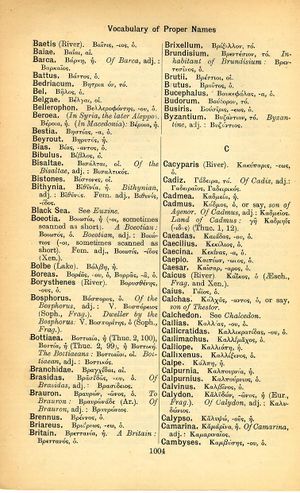Byzantium
πρὸ τελευτῆς μὴ μακάριζε μηδένα, καὶ ἐν τέκνοις αὐτοῦ γνωσθήσεται ἀνήρ → Count no man blessed before his end; a man will be recognized in his offspring. (Ecclesiasticus 11:28)
English > Greek (Woodhouse)
Βυζάντιον, τό.
Byzantine, adj.: Βυζάντιος.
Latin > English (Lewis & Short)
Bȳzantĭum: ii, n., = Βυζάντιον,
I a city in Thrace, on the Bosphorus, opposite the Asiatic Chalcedon, later Constantinopolis, now Constantinople; among the Turks, Istamboul or Stamboul (i.e. εις τὴν πόλιν), Mel. 2, 2, 6; Plin. 4, 11, 18, § 46; 9, 15, 20, § 50 sq.; Nep. Paus. 2, 2; Liv. 38, 16, 3 sq.; Tac. A. 12, 63 sq.; id. H. 2. 83; 3, 47 al.—
II Derivv.
A Bȳzantĭus, a, um, adj., of Byzantium, Byzantine: litora, the Strait of Constantinople, Ov. Tr. 1, 10, 31: portus, Plin. 9, 15, 20, § 51.—Subst.: Bȳ-zantĭi, ōrum, m., the inhabitants of Byzantium, Cic. Prov. Cons. 3, 5; 4, 6 sq.; id. Verr. 2, 2, 31, § 76; Nep. Timoth. 1, 2; Liv. 32, 33, 7.—
B Bȳzantĭăcus, a, um, adj., of Byzantium: lacerti, Stat. S. 4, 9, 13. —
C Bȳzantīnus, a, um, adj., the same (post-class.): Lygos, Aus. Clar. Urb. 2: frigora, Sid. Ep. 7, 17.
Latin > French (Gaffiot 2016)
Byzantĭum¹² (-tĭŏn), ĭī, n. (Βυζάντιον), Byzance [postérieurement Constantinople, ville sur le Bosphore de Thrace] : Cic. Sest. 56 ; Domo 52 ; Liv. 38, 16, 3 || -tĭăcus Stat. S. 4, 9, 13 ; -tīnus Tert. Scap. 3 ; -tĭus, a, um Cic. Domo 129 ; Hor. S. 2, 4, 66, de Byzance, byzantin || Byzantĭī, ōrum, m., habitants de Byzance : Cic. Verr. 2, 2, 76.

